When your beloved pet is sick, those Caribbean sunsets stop taking your breath away and simply mark the end of another day of hurt. “Mon chat est très malade,” I explained in broken French, “Elle ne mange pas.” My head spun as I tried to form the words that could explain to the vet that Dot had stopped eating and was deteriorating fast. Emotions and heartache suffocated words en route from my brain to my mouth. The contradiction in my body flooded me with memories of trying to comprehend the doctor’s treatment plan while still digesting the words, “You have cancer.”
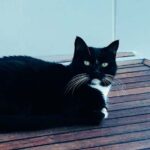 When I first noticed Dot wasn’t eating, I thought her food had gone rancid, not unlike many foods do in this salty, humid environment. As the dish of fresh food and her favorite treats stood untouched, I began considering other possibilities. Was she nauseous from drinking salt water off the decks? Had she been bitten by a bug or spider? One of our guests had arrived from South America sporting a large, swollen wound on his shin from a spider bite. And then another of our guests got a spider bite. We’re on a boat for heaven’s sakes—spiders aren’t supposed to be here! Maybe a spider stowed away in the luggage of our South American guest and is now spreading his venom onboard. Or maybe our sweet girl has cancer?
When I first noticed Dot wasn’t eating, I thought her food had gone rancid, not unlike many foods do in this salty, humid environment. As the dish of fresh food and her favorite treats stood untouched, I began considering other possibilities. Was she nauseous from drinking salt water off the decks? Had she been bitten by a bug or spider? One of our guests had arrived from South America sporting a large, swollen wound on his shin from a spider bite. And then another of our guests got a spider bite. We’re on a boat for heaven’s sakes—spiders aren’t supposed to be here! Maybe a spider stowed away in the luggage of our South American guest and is now spreading his venom onboard. Or maybe our sweet girl has cancer?
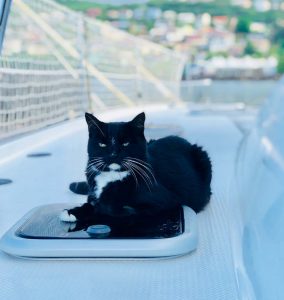 Dot’s appetite continued to wane as she declined even a can of fresh tuna. She would approach the food with genuine curiosity and then turn away as though to say, “I wish I could, but frankly it would ruin my diet.” We tried it all—different cat foods and cat treats, milk and chicken, even French delicacies like smoked jambon and paté. We were encouraged when Dot would eat a few pieces of ham but the next day, the ham was snubbed and placed on the growing list of failed foods. At just 9 pounds when she’s healthy, it didn’t take long before Dot’s black pelt started to hang on her thinning body. She began spending less time cuddling and having her tummy petted and more time sitting quietly alone. Was this just the beginning of the end for our 14-year old cat? Or, was it something else? Where was Dr. Doolittle when I so badly wanted my kitty to tell me what was wrong? Thousands of miles away from our vet in California, I set out to find a vetèrinaire in this French-speaking part of the world.
Dot’s appetite continued to wane as she declined even a can of fresh tuna. She would approach the food with genuine curiosity and then turn away as though to say, “I wish I could, but frankly it would ruin my diet.” We tried it all—different cat foods and cat treats, milk and chicken, even French delicacies like smoked jambon and paté. We were encouraged when Dot would eat a few pieces of ham but the next day, the ham was snubbed and placed on the growing list of failed foods. At just 9 pounds when she’s healthy, it didn’t take long before Dot’s black pelt started to hang on her thinning body. She began spending less time cuddling and having her tummy petted and more time sitting quietly alone. Was this just the beginning of the end for our 14-year old cat? Or, was it something else? Where was Dr. Doolittle when I so badly wanted my kitty to tell me what was wrong? Thousands of miles away from our vet in California, I set out to find a vetèrinaire in this French-speaking part of the world.
At the time, we were in Les Saintes—a small archipelago off the main island of Guadaloupe. It’s one of the most picturesque places you’ll ever visit with quaint boutiques lining the front street and restaurants that serve haute cuisine while you sit with your feet in the sand. Homes and shops boast their individuality with bright Caribbean colors and uniquely-styled front doors, but unite in symmetry under those famous red roofs that dot their ancestral European villages.
All this nestled below the historic Fort Napoléon on one side and one of our favorite hiking destinations, Le Chameau, on the other. Thousands of tourists from around the world arrive each day in this little paradise on an early morning ferry. They shop, they eat, they sightsee on their rented mopeds, they eat some more, and then they depart on the 4pm ferry, returning the little town to its homeowners and lucky people like us who are anchored in the bay. Les Saintes has it all, except for a veterinarian.
 I’ve mastered ordering croissants and a baguette in French, but I had to really dig deep in the language lobe of my brain to find a vetèrinaire, explain le problème, and make an rendez-vous. During our many trips in and around Guadaloupe, we had befriended a taxi driver. Françoise was much more than a driver, helping us provision at grocery stores, delivering guests from the airport and then returning them, and always always arriving with a smile. “De rien,” she would say when we thanked her. And she genuinely meant it was nothing at all to provide the service. Naturally, Françoise was my go-to person in our pet crisis. Over the course of several Franglais texts, Françoise found a veterinarian in mainland Guadaloupe, arranged a Saturday appointment, and promised to shuttle us from the 7:15am ferry to the vet. I am forever grateful for her help and compassion.
I’ve mastered ordering croissants and a baguette in French, but I had to really dig deep in the language lobe of my brain to find a vetèrinaire, explain le problème, and make an rendez-vous. During our many trips in and around Guadaloupe, we had befriended a taxi driver. Françoise was much more than a driver, helping us provision at grocery stores, delivering guests from the airport and then returning them, and always always arriving with a smile. “De rien,” she would say when we thanked her. And she genuinely meant it was nothing at all to provide the service. Naturally, Françoise was my go-to person in our pet crisis. Over the course of several Franglais texts, Françoise found a veterinarian in mainland Guadaloupe, arranged a Saturday appointment, and promised to shuttle us from the 7:15am ferry to the vet. I am forever grateful for her help and compassion.
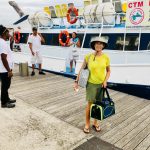 Morning arrived quickly after a sleepless night. We prepared the dinghy, our usual transportation from anchor to shore, and Dot took the first of what would be many ambulance dinghy rides. With cat carrier in hand, I purchased a ferry ticket, bid Allen farewell, and boarded the passenger ferry to Trois Rivières in Guadaloupe. Dot would have said it felt like another airplane flight back to California where she would be confined to her carrier under the seat without food or a litter box for about 20 hours. Truly, she was an extraordinary cat and I hoped with all my heart that this mere 30-minute passage would provide answers and return her to good health. As we departed the bay in our motorized vessel, I took comfort in seeing Allen under sail on Gémeaux with his two visiting brothers. Dot’s declining health had dictated a new itinerary where Allen would undertake the slower 4-hour sail with his brothers and we would all eventually meet in Guadaloupe.
Morning arrived quickly after a sleepless night. We prepared the dinghy, our usual transportation from anchor to shore, and Dot took the first of what would be many ambulance dinghy rides. With cat carrier in hand, I purchased a ferry ticket, bid Allen farewell, and boarded the passenger ferry to Trois Rivières in Guadaloupe. Dot would have said it felt like another airplane flight back to California where she would be confined to her carrier under the seat without food or a litter box for about 20 hours. Truly, she was an extraordinary cat and I hoped with all my heart that this mere 30-minute passage would provide answers and return her to good health. As we departed the bay in our motorized vessel, I took comfort in seeing Allen under sail on Gémeaux with his two visiting brothers. Dot’s declining health had dictated a new itinerary where Allen would undertake the slower 4-hour sail with his brothers and we would all eventually meet in Guadaloupe.
As promised, Françoise met us at the ferry station. Usually a jovial ride with French lessons and questions about local culture, we drove in silence during the 45-minute drive. Dot’s condition weighed heavily on my mind. Every now and again from our shoreline highway, I would catch a faint glimpse of Gémeaux making her way to me from the distant horizon. As Françoise’s taxi approached the tattered building of the local veterinary clinic, I had to remind myself not to judge a book by its cover. As Americans, we’ve become so used to shiny new markets and manicured landscaping, ne’er a blade of grass out of place. How often do we allow the outside of the business or the school or the home to dictate its quality and never step inside? This neighborhood veterinary clinic had given a complete stranger, not even from its own community, a highly-coveted Saturday appointment just hours earlier. Today, the cover certainly didn’t matter.
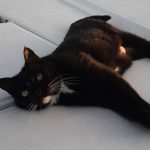 Blood results showed elevated enzymes in her foie…as in foie gras? I know that word. But why? And was the compromised liver causing the anorexie, or was the lack of eating compromising the foie? We left with a handful of medicines and specialized cat food, touted as a food that tous les chats adorent, and made another dinghy crossing to our new anchorage. The next day was Sunday, when all of Guadaloupe would close. If there still was no improvement we would return to the vet on Monday for intravenous fluids. Dot did not adore the specialized cat food and when Monday came, she returned to the vet.
Blood results showed elevated enzymes in her foie…as in foie gras? I know that word. But why? And was the compromised liver causing the anorexie, or was the lack of eating compromising the foie? We left with a handful of medicines and specialized cat food, touted as a food that tous les chats adorent, and made another dinghy crossing to our new anchorage. The next day was Sunday, when all of Guadaloupe would close. If there still was no improvement we would return to the vet on Monday for intravenous fluids. Dot did not adore the specialized cat food and when Monday came, she returned to the vet.
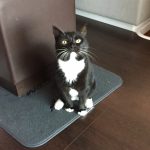 The hours ticked by slowly as we remained hopeful that fluids would jump start Dot’s appetite and outweigh the stress of an 10-hour stay à l’hôpital. It was nearly 7pm when the busy veterinary office slowed down and we could discuss Dot’s condition with the vet. An ultrasound showed that Dot had indeed a fois abnormal but still we had no diagnosis. We left again with a handful of new medicines and made the dinghy crossing in the dark of night. There would be no return the following day. Tuesday was a jour férié celebrating France’s end of WW2. Not only was Tuesday a public holiday, but Thursday all businesses would close again to observe Ascension Day. It was a bad week to need medical care.
The hours ticked by slowly as we remained hopeful that fluids would jump start Dot’s appetite and outweigh the stress of an 10-hour stay à l’hôpital. It was nearly 7pm when the busy veterinary office slowed down and we could discuss Dot’s condition with the vet. An ultrasound showed that Dot had indeed a fois abnormal but still we had no diagnosis. We left again with a handful of new medicines and made the dinghy crossing in the dark of night. There would be no return the following day. Tuesday was a jour férié celebrating France’s end of WW2. Not only was Tuesday a public holiday, but Thursday all businesses would close again to observe Ascension Day. It was a bad week to need medical care.
Once back to Gémeaux, Dot appeared alert and feeling better, although admittedly our glasses were a bit rose colored. After thoughtful deliberation and hopeful that Dot was beginning to heal, we decided to continue our sail south. The vet in Guadaloupe had done all she thought sh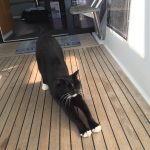 e could do and furthermore wouldn’t be available the next day. By Wednesday, we would be in Martinique where, if Dot needed more medical care, a different vet on a more populated island might have a diagnosis. At this point, I reached out to our long-time vet in California by email and phone. She was compassionate yet direct, and offered what I needed most—just to talk in English about Dot’s worrisome condition and validate our treatment plan.
e could do and furthermore wouldn’t be available the next day. By Wednesday, we would be in Martinique where, if Dot needed more medical care, a different vet on a more populated island might have a diagnosis. At this point, I reached out to our long-time vet in California by email and phone. She was compassionate yet direct, and offered what I needed most—just to talk in English about Dot’s worrisome condition and validate our treatment plan.
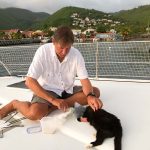
Eating continued to be a problem but apart from shedding a vast amount of weight, Dot seemed normal. She wandered the boat and continued to drink water from the faucet and use her litter box. This is always the difficulty in assessing how to handle a pet’s declining health and to know if indeed the end is near, or if all she really needs is a little more food and medicine to swing the pendulum the other way. Many people would say that giving milk and baby food through a syringe was going too far. Others, who know the absolute love of animals that Allen and I share, understand completely.
When Savannah, Allen’s standard poodle andthe love of his life, was in the final days of her life, he sat with her day and night, lovingly feeding her bits of a hotdog that a friend had brought to sustain Allen. Once we arrived in Martinique, we sought the local vetèrinaire in the town of Case-Pilote and decided to give Dot one more round of treatment. She would stay à l’hôpital for the weekend to receive fluids and a nasal feeding tube.
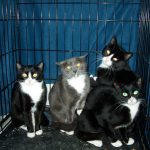 Dot’s a tough girl. She was born 14 years ago into a litter of feral cats near my home in California. Having the Brady gene to save all furry critters large and small, weak and sick, I set out to trap and neuter Dot’s feral colony of 18 cats. It was an arduous process that required great patience and perseverance—after all, it only works if you neuter them all. Neighborhood cat lovers and my long-time vet (yep, the same one) collaborated to end this reproductive cycle. We would trap a cat, transport it to the vet to spay/neuter, and then keep it in one of four dog crates in my garage until all cats were trapped. Ultimately, we would release them back to their outdoor home, but only after they were all trapped; otherwise, we would repeatedly trap the same cats. Boy were those cats fierce—they would hiss and claw, spit in your face, and lunge at you when you reached in with gloves and a pair of tongs to refill their food and water.
Dot’s a tough girl. She was born 14 years ago into a litter of feral cats near my home in California. Having the Brady gene to save all furry critters large and small, weak and sick, I set out to trap and neuter Dot’s feral colony of 18 cats. It was an arduous process that required great patience and perseverance—after all, it only works if you neuter them all. Neighborhood cat lovers and my long-time vet (yep, the same one) collaborated to end this reproductive cycle. We would trap a cat, transport it to the vet to spay/neuter, and then keep it in one of four dog crates in my garage until all cats were trapped. Ultimately, we would release them back to their outdoor home, but only after they were all trapped; otherwise, we would repeatedly trap the same cats. Boy were those cats fierce—they would hiss and claw, spit in your face, and lunge at you when you reached in with gloves and a pair of tongs to refill their food and water.
Some of the cats were young and could be tamed. I confined these cats to a spare room and each day my children and I would feed them and talk to them, hold them and play with them. Eventually, we would domesticate the cats to the point where they could be adopted by weak-hearted and generous friends. Dot was one of the young ones that I tamed. I knew from the beginning that she was a special cat. She didn’t even require a trap. Unlike most of the feral cats who would scamper when I approached their forested home during feeding time, Dot would stay put—one eye on her food and one eye on me. She would actually purr while she was eating. One day, with great apprehension, she allowed me to get close enough where I could touch her while she ate. In a decisive moment, I scruffed the back of her neck, held firmly while she kicked and wailed, and finally thrust her little body into a pet carrier before she could bite my hand off. Some day she would be a cat who liked to have her belly rubbed; today, she was mad as hell.
Once this angry kitty relented from her ceiling perch on the bathroom light in the spare room, she slowly came around. We named the little tuxedo kitten Dot because of the white dot on her nose. She learned her name quickly and I discovered right away that she would come when I called her. She was the last of the cats to be adopted; unbeknownst to me, she would never leave. Each time a potential adoptive family would visit, Dot would lay those ears back with a frown and cantankerous look and then delight in her devious triumph as frightened families cowered away. It was then I knew Dot had forgiven me for that evil scruff and claimed me as her mama forever.
 In many ways, Dot’s relationship with me was like that of a loyal dog. She was always by my side. The more trust I built with her through patience and affection, the more Dot gave to me. She was my tummy pillow during my long recovery from a hysterectomy. When I discovered my husband at that time was having multiple affairs and I spent many many days under the covers in deep despair, Dot cuddled with me. Anytime I called for her, she came, jumped onto my lap and basked in the affection. I mastered the technique of stroking her back so after a few seconds, she would simply collapse onto her side giving me permission to pet her tummy—the ultimate testament in trust. Often, we would fall asleep like this and I would awake to find her still curled around my hand.
In many ways, Dot’s relationship with me was like that of a loyal dog. She was always by my side. The more trust I built with her through patience and affection, the more Dot gave to me. She was my tummy pillow during my long recovery from a hysterectomy. When I discovered my husband at that time was having multiple affairs and I spent many many days under the covers in deep despair, Dot cuddled with me. Anytime I called for her, she came, jumped onto my lap and basked in the affection. I mastered the technique of stroking her back so after a few seconds, she would simply collapse onto her side giving me permission to pet her tummy—the ultimate testament in trust. Often, we would fall asleep like this and I would awake to find her still curled around my hand.
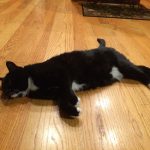 When I left Dot, however, she was forlorn. House sitters would tell me that while I was out-of-town Dot was nowhere to be seen. Upon my return, I’d wander outside in the quiet darkness after everyone in the house had gone to bed, and call Dot in my sing-songy voice. Sometimes it took a few calls but eventually, I’d hear that faint meow reply. We continued the conversation until Dot returned home, confident that her safe environment had been restored. As years passed, Dot developed a shrewd technique guaranteed to keep me at home—she would leave her gift of urine on everything while I was gone. This tactic eventually earned Dot a place on Gémeaux. She’s a sly one.
When I left Dot, however, she was forlorn. House sitters would tell me that while I was out-of-town Dot was nowhere to be seen. Upon my return, I’d wander outside in the quiet darkness after everyone in the house had gone to bed, and call Dot in my sing-songy voice. Sometimes it took a few calls but eventually, I’d hear that faint meow reply. We continued the conversation until Dot returned home, confident that her safe environment had been restored. As years passed, Dot developed a shrewd technique guaranteed to keep me at home—she would leave her gift of urine on everything while I was gone. This tactic eventually earned Dot a place on Gémeaux. She’s a sly one.
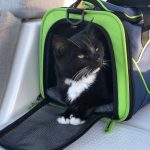 Having Dot with us on the boat has been an adventure. Rough seas, loud boat noises, airplane travel to and from foreign countries, constant exams—the list is long but Dot has persevered and even flourished as a boat cat. Once a frightened cat stowed away in the closet, she now claims the 44 feet of fiberglass as her domain. Creaks and crashes hardly make her flinch. She rides in her carrier with us at the helm, whiskers whipping in the wind. She jumps through open hatches like they are cat doors and prowls the boat at night. Life on a boat with a pet is complicated, but we couldn’t imagine life without her.
Having Dot with us on the boat has been an adventure. Rough seas, loud boat noises, airplane travel to and from foreign countries, constant exams—the list is long but Dot has persevered and even flourished as a boat cat. Once a frightened cat stowed away in the closet, she now claims the 44 feet of fiberglass as her domain. Creaks and crashes hardly make her flinch. She rides in her carrier with us at the helm, whiskers whipping in the wind. She jumps through open hatches like they are cat doors and prowls the boat at night. Life on a boat with a pet is complicated, but we couldn’t imagine life without her.
 It’s Saturday now. Our other sick cat(amaran) has been revived and her port engine is as good as new. We’re ready to continue sailing south to Grenada so we can return to California at the end of the month. We remain tied to the Volvo Diesel repair dock in Case-Pilote, however, anxious and hopeful that Dot heals. She’s been on a feeding tube and intravenous fluids for nearly 48 hours. Just writing those words sounds awful and wreaks havoc with my heart as I try to balance hanging on and letting go.
It’s Saturday now. Our other sick cat(amaran) has been revived and her port engine is as good as new. We’re ready to continue sailing south to Grenada so we can return to California at the end of the month. We remain tied to the Volvo Diesel repair dock in Case-Pilote, however, anxious and hopeful that Dot heals. She’s been on a feeding tube and intravenous fluids for nearly 48 hours. Just writing those words sounds awful and wreaks havoc with my heart as I try to balance hanging on and letting go.

The vet is kind and compassionate, soft-spoken and gentle as she examines Dot. She speaks little English but our mutual love for animals bridges the gap. She allows us to visit after their practice closes on Friday and then again on Saturday morning. We poke our heads into Dot’s crate and talk to her. The look on her face reminds me of that long ago day when I snatched her from the wild. I hope she is indeed angry—that would be a sign of recovery. When she flicks her tail and inches slowly onto her back, we know she’s glad we’re there and we haven’t abandoned her in a French torture chamber.
Dot died two days later. The vet had let us take Dot home on Saturday night, after showing us how to administer liquid food in a feeding tube and give injections of medicine. At bedtime, Dot purred when she curled up next to me—a sure sign, I thought, that she was on the mend after food got into her belly. We spent Mother’s Day doing what only parents would do—feed their sick baby through a syringe every two hours. With each feeding I could see her belly grow and fill with nutrients. And then, before day broke the next morning, Dot vomited every precious little ounce we had fed her. She just couldn’t digest the very thing she needed to sustain her life. There was no more purring, just a look that every mother knows when their baby hurts. My heart ached. Tears streamed down my face as emotions once again stifled my ability to find the French words. There was no mincing words, no elegant prose to tell the vet it was time to let Dot go. Dot had a maladie en phase terminale and I blubbered out the need for euthanasie.
Ensconced in a little cardboard casket inside her pet carrier, Dot continued sailing with us for a few more days. It was comforting knowing in some ways she was still there and I was grateful for a little more time to process the loss. We bid farewell to Case-Pilote, a town that will forever hold a special place in our hearts, and continued our journey south. Sails flapped and waves crashed but the helm was quiet as we let the monotony of an endless sea carry away our grief. At the base of St. Lucia’s majestic Pitons deep in the sea below, we said a final goodbye and laid Dot to rest.
I have loved and lost many pets in my life. The more I love them, the more it hurts when I lose them. I loved Dot deeply. We shared an amazing journey that started with a frown and grew with trust. She brightened many of my days and kept me standing tall on others. She was a great pet, friend, and shipmate. She remains forever in our hearts and I will smile each time I find one of those little black hairs aboard Gémeaux. Her carrier remains onboard with us…just in case another frowning kitty crosses my path.
Enjoyed this post?
Sign up to receive email notifications of future posts!

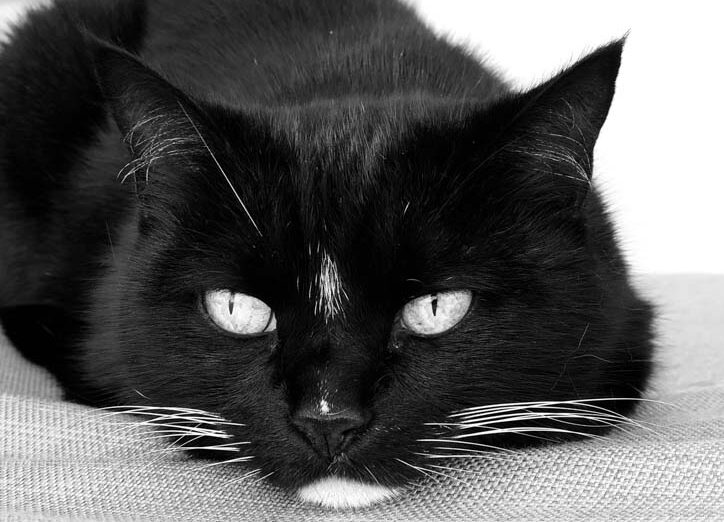






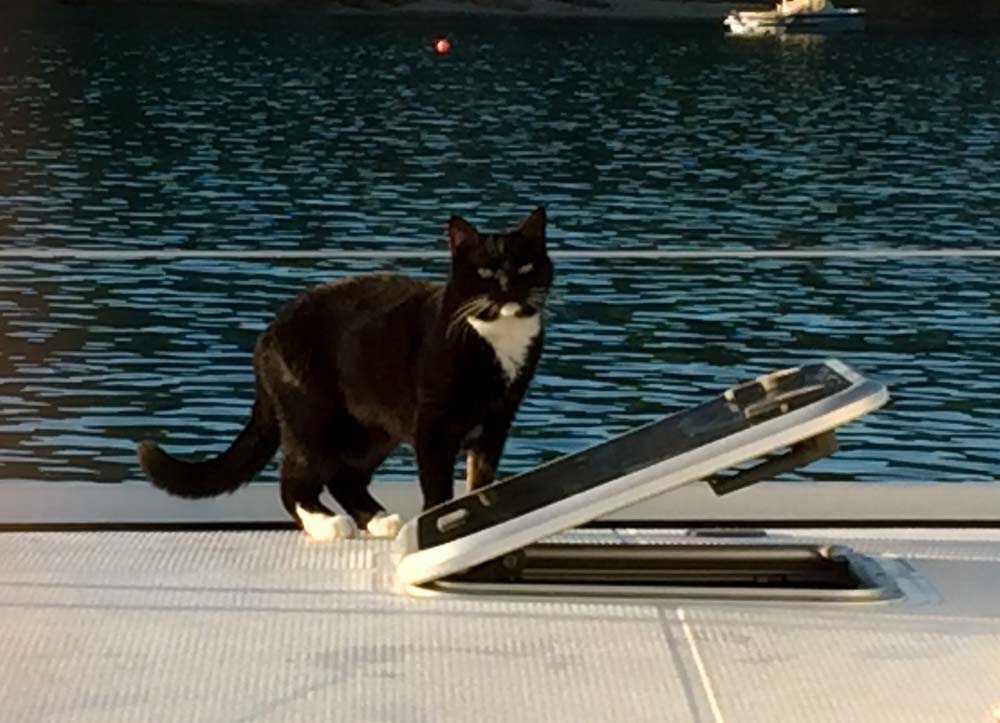
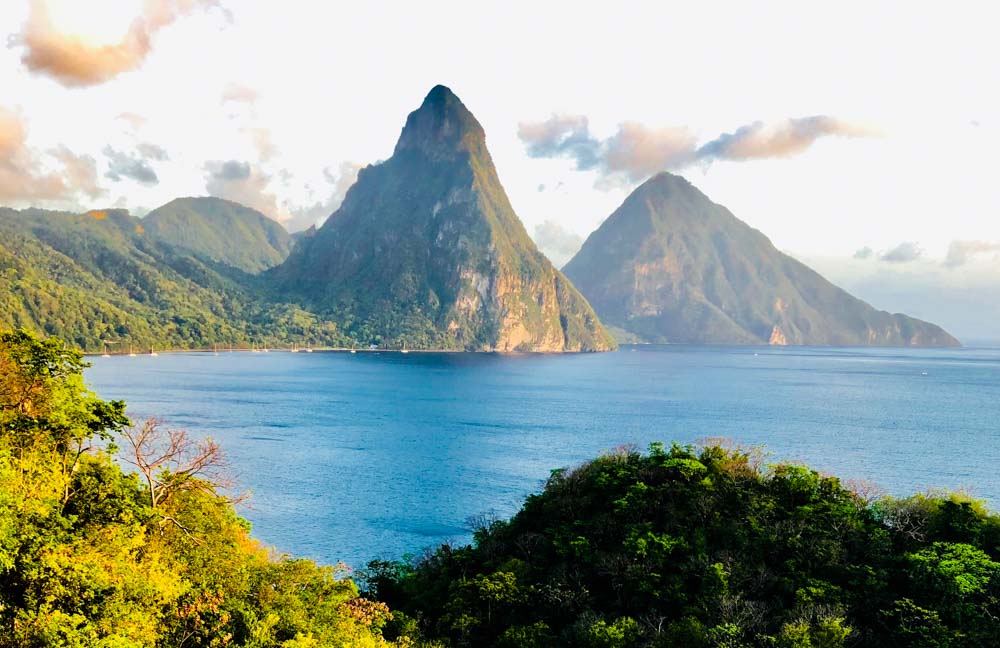
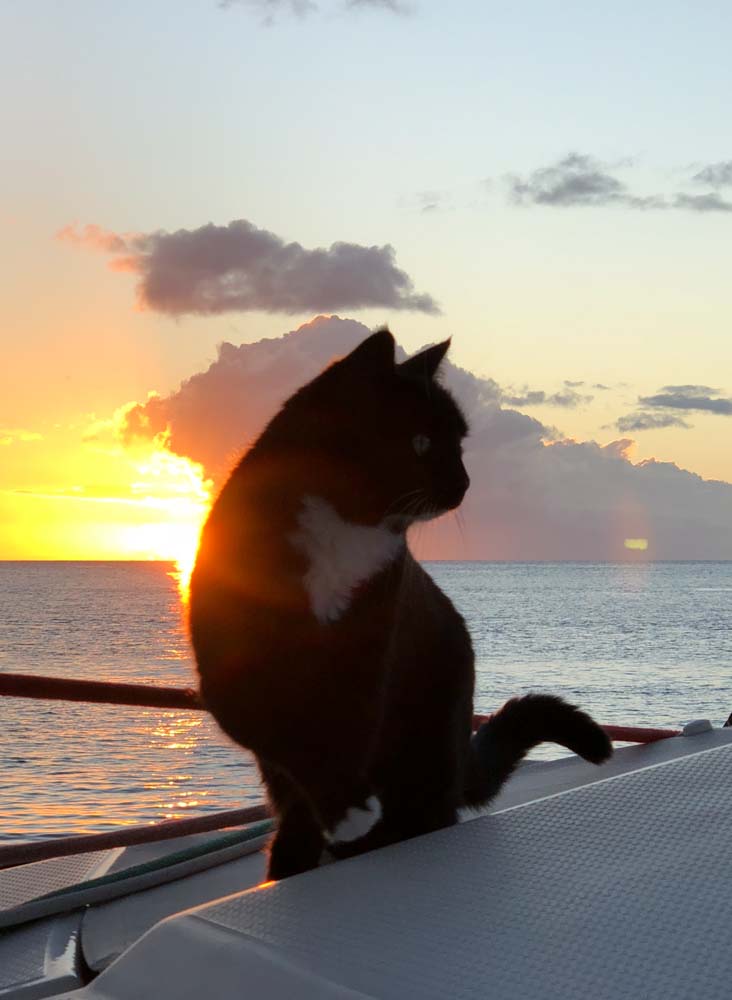

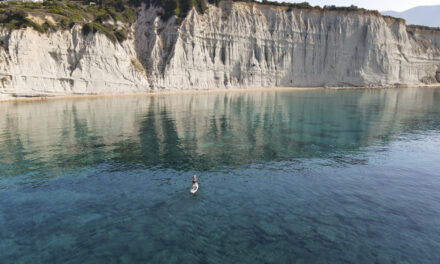
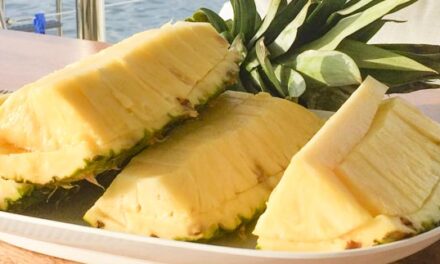
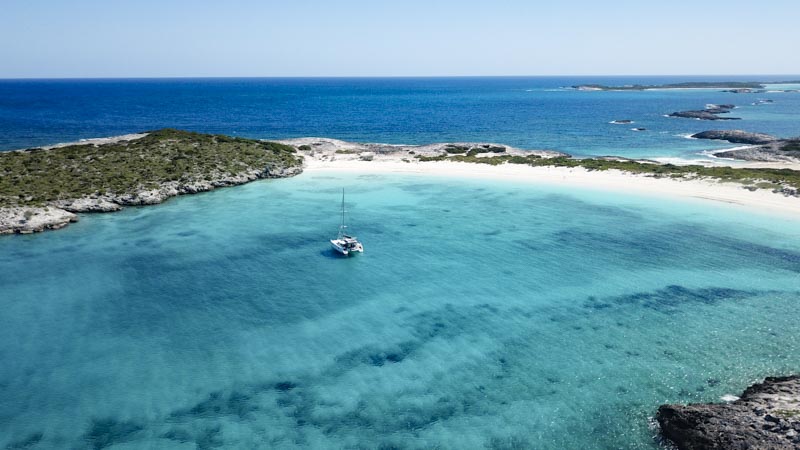
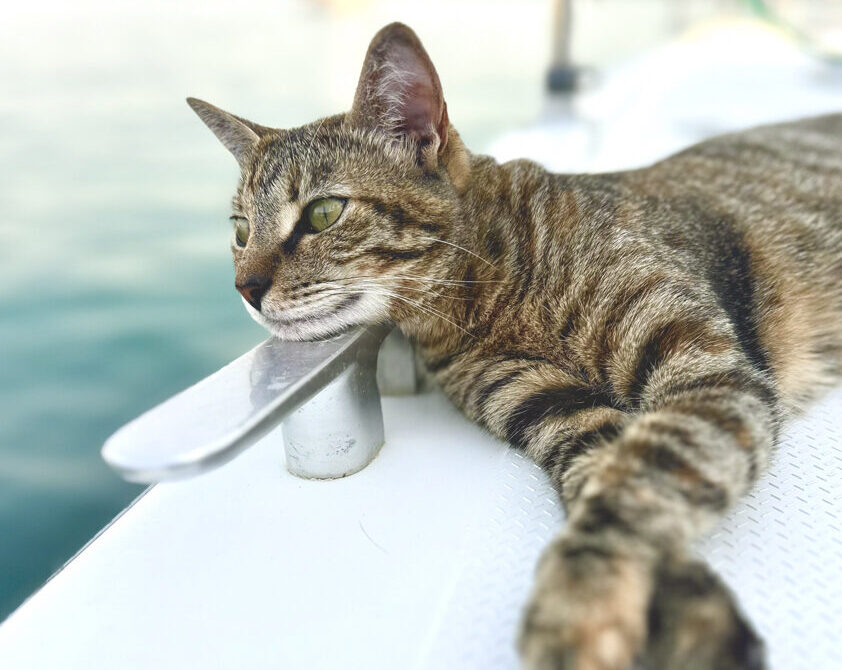
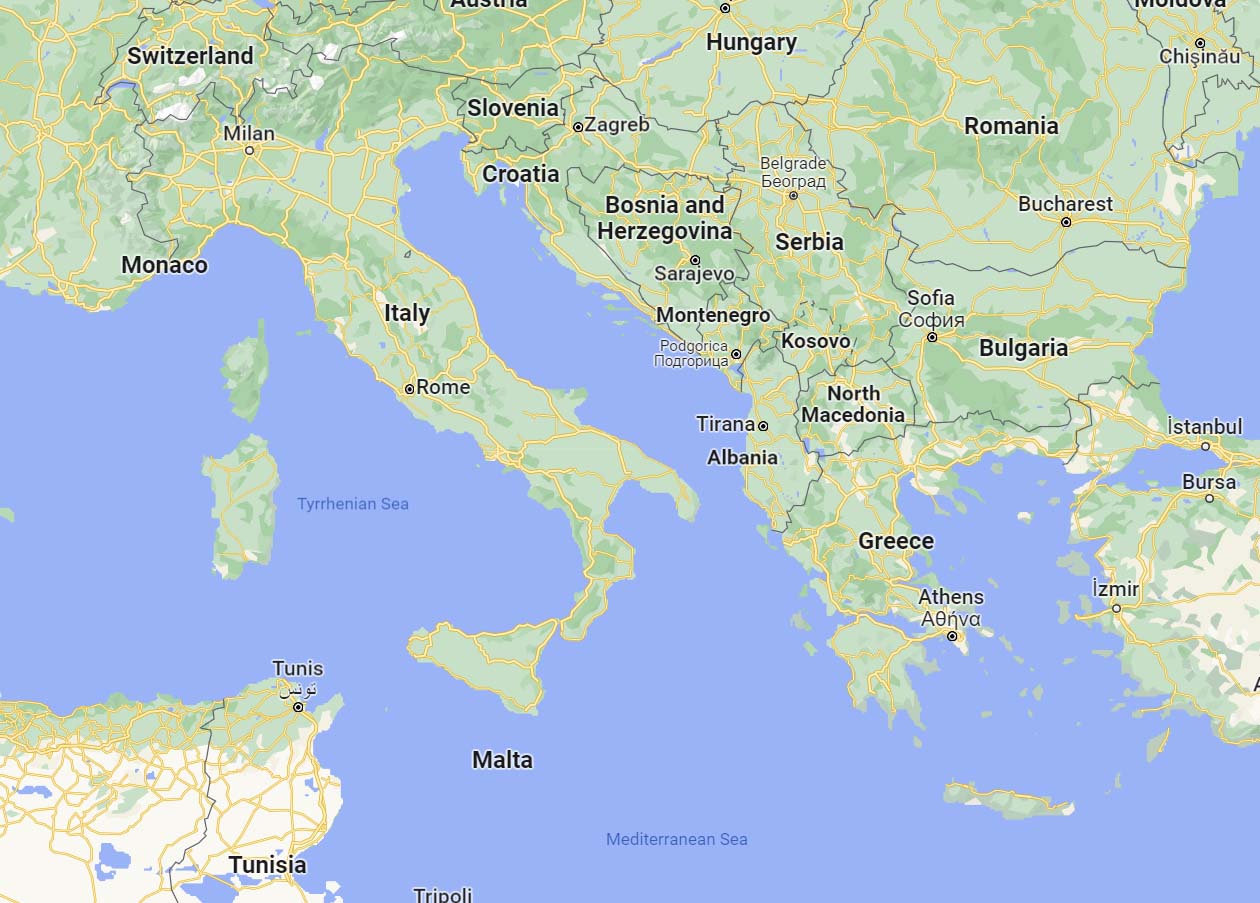
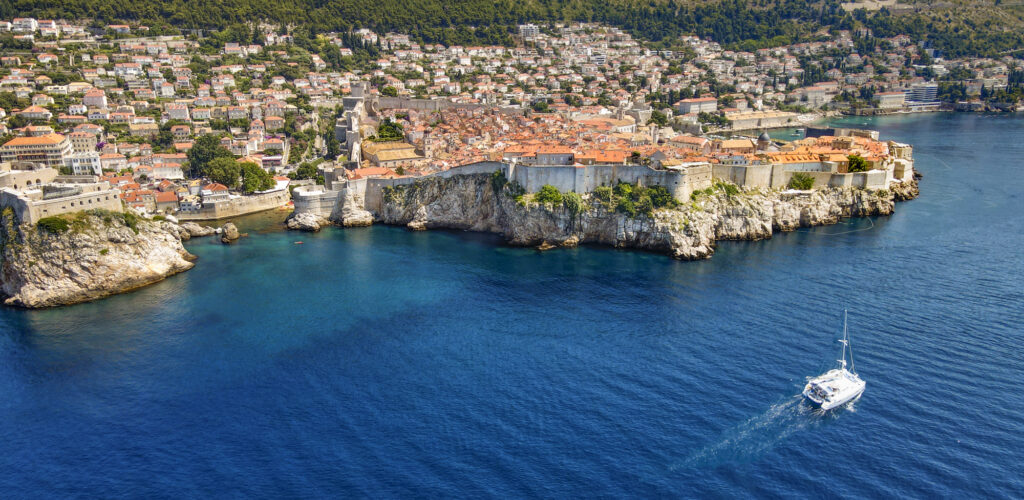
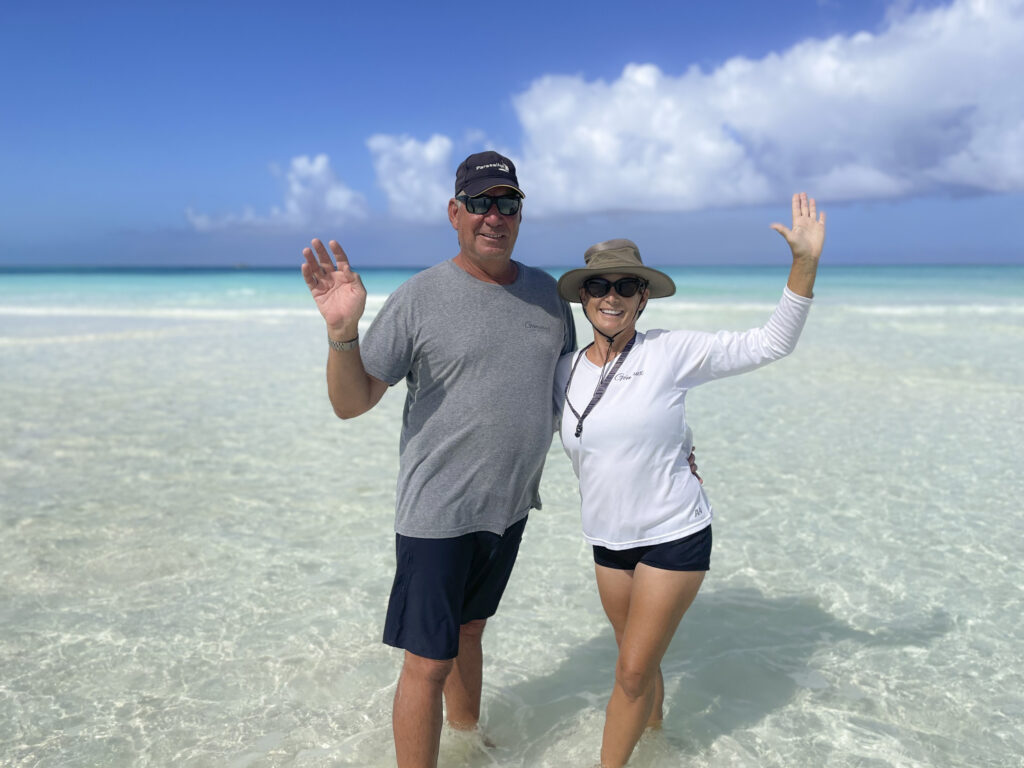
A beautiful tribute. As ones who went through the same kind of pain in Grenada, my heart breaks for you. Tears for Dot and for you today.
Such a sad but lovely story, my tears fell throughout. So sorry for your loss, but so glad you and Dot shared meaningful time together. Her adventures as a “boat cat” made me smile. Thinking of you, my friend.
J’adore. ?????
I, too, knew Dot all those years as her Mima Gwen. She was a sweet but feisty little cat who we will miss. She could not have had a better forever home, either on land or on sea. Sweet dreams.
Thank you for this piece, Shiera. My heart is breaking as I read it. Dot was a special cat cared for by a special person.
Oh my friend- so very sorry for your loss- you have such a way with words … I was right there with you during everything you endured. You and Alan are special people and I was very lucky to have you. She’s shared an adventure with you that you will never forget … my thoughts are with you
Dear friend, what a beautiful tribute for your furry baby. My heart broke (again) reading your post.
She was smart having adopted you. You clearly showered her with love and she reciprocated equally and unconditionally.
Adieu Dot…sweet sailor. Shiera your patience is legendary- from long long ago I’ve admired it. So sad to hear the story – I figured there had to be one when I saw your card. The tears have dried, my Sully has joined me at the keyboard and I’m impossibly trying to type one-handed! You and Allen’s storytelling is a great way to avoid doing what I really should be doing…catching up on your adventures is way worth it!